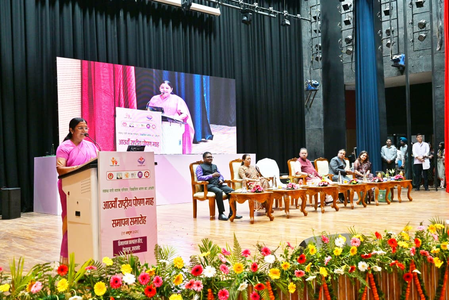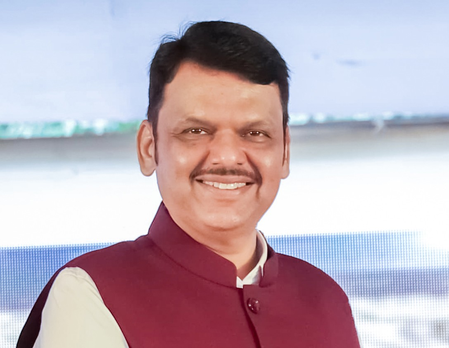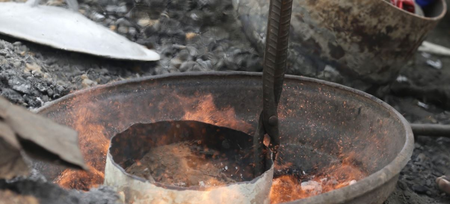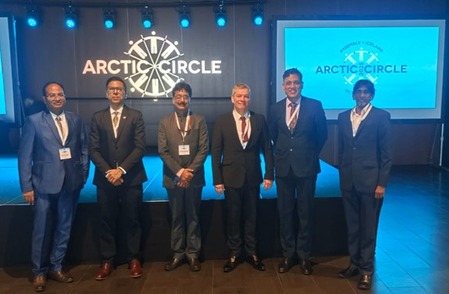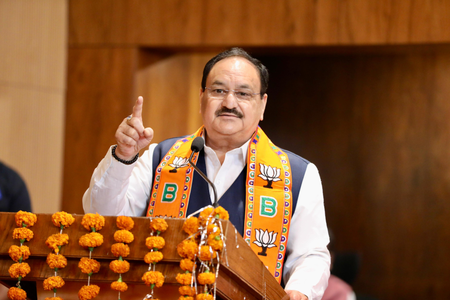
Jabalpur, Aug 25 (IANS) Out-of-pocket healthcare spending of common man in India has plummeted — from 62 per cent to just 32 per cent — a shift Union Health Minister J.P. Nadda attributed to sweeping systemic reforms initiated by Prime Minister Narendra Modi.
Speaking in Jabalpur while initiating contract for four new medical colleges under the Public-Private Partnership (PPP) model, J.P. Nadda credited the expansive reach of Ayushman Bharat, which he described as “the world’s largest health coverage scheme”.
“Our Prime Minister introduced a holistic health policy encompassing preventive, promotive, curative, palliative, and geriatric care — moving beyond the earlier focus on curative treatment alone,” J.P. Nadda said.
He cited national movements like ‘Fit India’ and campaigns to reduce 10 per cent edible oil consumption as part of this broader health vision. The BJP president announced that Ayushman Bharat now covers citizens above seventy years of age, ensuring lifelong protection for the elderly.
To illustrate the robustness of India’s health infrastructure, he noted that over five crore maternal and child health cases are tracked annually, supported by nearly two crore births and the tireless efforts of Asha workers.
Every pregnant woman receives five antenatal check-ups, or eight in high-risk cases involving super-specialists. Children aged 0 to 16 are administered 27 doses of 11 vaccines for 12 preventable diseases, with digital alerts and Asha outreach ensuring coverage. Institutional deliveries have reached 89 per cent, even in remote regions like Drass and Kanker.
India’s maternal mortality rate has dropped from 130 to 93 per lakh, while under-five child mortality has declined by 43 per cent — far surpassing the global average of 14 per cent.
Neonatal mortality, currently at 39 per cent, remains under active intervention through targeted programs.
Screening efforts have scaled dramatically. Over 39 crore citizens have been screened for hypertension (5.2 crore diagnosed), and 3.5 crore for diabetes.
Cancer detection has expanded as well — 33 crore screened for oral cancer, 10.3 crore women for cervical cancer, and 17 crore for breast cancer—with treatment initiated for all diagnosed cases. In a striking comparison, J.P. Nadda praised India’s vaccine innovation.
“Under Prime Minister Modi’s leadership, we developed two vaccines in nine months—what took the world a century for Japanese encephalitis, India achieved in less than a year. This is the new India,” he said.
The minister, also BJP national president, inaugurated two new government medical colleges in Sheopur and Singrauli, each offering 100 MBBS seats and built at a combined cost exceeding Rs 547 crore.
The state government also signed MoUs for four additional medical colleges to be established under the PPP model in Dhar, Betul, Panna, and Katni.
With these additions, Madhya Pradesh now hosts 17 government and 13 private medical colleges, bringing the total to 30.
The announcement, made at Netaji Subhash Chandra Bose Medical College, signals a decisive expansion of medical education in a state rapidly emerging as a national leader in public health.
“Madhya Pradesh is not merely participating — it is leading the transformation in healthcare delivery and medical education,” J.P. Nadda said, emphasising the PPP model’s role in democratising access to quality education in underserved districts.
Chief Minister Mohan Yadav was also present at the occasion, underscoring the state’s commitment to healthcare excellence.
As Madhya Pradesh deepens its investment in public health, the fusion of government resolve and private innovation appears poised to redefine the contours of medical education across India.
–IANS
sktr/pgh

